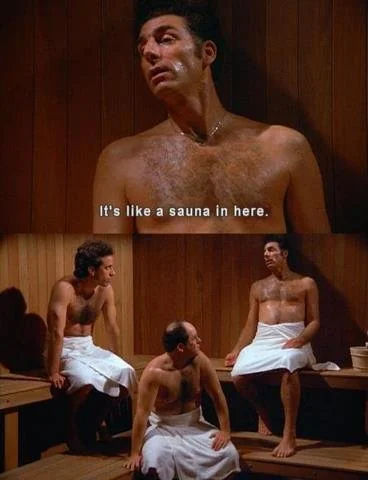Saunas Aren’t Third Spaces…No Matter How Hard We Convince Ourselves

Before we get into it, I should caveat that I’m a millennial who grew up on seshes, raving, drinking Frosty Jack’s cider in the park and borrowing older friends’ IDs to get into clubs. My idea of fun and socialising is centred around those kinds of experiences, for better or worse, but across all of my travels, there are universal experiences. Three things bring people together for no other purpose than to be present: food, music and drink.
By viewing London through this lens, the city's character becomes easier to understand and define. However, it’s daunting that there are fewer and fewer accessible spaces where Londoners can enjoy these three experiences, and a healthy city would ensure that these spaces are celebrated.
Third spaces have been the catchphrase of 2025, and there’s enough debate currently out there about London’s lack of them, but the city’s future rests on its appeal as a cultural and leisure hotspot. While the stats clearly show that saunas are becoming increasingly popular among young people in the UK, non-experience-based third spaces aren’t as common as they used to be. Sometimes, the experience is just hanging out, street corner, playground, at a park, in a library or coffee shop or shopping centre and just shooting the shit with friends.
We know that alcohol can be a lubricant that’s excessively used to accelerate conversations. Still, many of our formative experiences are often formed over a table– and I use that loosely. To quote the late, great Anthony Bourdain, taken from Parts Unknown: "This is the dream of all the world. The dream is to live in Granada. You know, work in the morning, have a one-hour nap in the afternoon, and at night go out and have that life. Go out and see your friends and eat tapas and drink red wine and be in a beautiful place."

It should be noted that Bourdain struggled with alcoholism throughout his life, and in truth, it’s one of the main catalysts for young people embracing sobriety. That said, there needs to be a balance, and a healthy city embraces wellness and hedonism in equal measure without ever tipping too far to either side. One team member described living in London as “being in a toxic relationship.” We choose to stay because the alternatives feel far more daunting, but many of the success stories of people leaving tell us that a better life outside of London is possible.
However, those born and raised in the city, or who have spent the majority of their adult life in London, shouldn’t have to leave. Cities have historically been sold as places that offer an abundance of choice and opportunity, but there’s only so much noise we can tolerate and, arguably, London is no longer fit for purpose.
It’s a trade port and centre of commerce first and foremost, culture and leisure come second, but do we want London to become one big wellness retreat? What happens to those who reject that kind of lifestyle? Saunas are great ways to wind down and release, but not everyone has access to a £25 p/h space, which, quite frankly, is ridiculous, but such is the reality of London. London needs a range and variety of spaces that cater to its population, which is largely made up of people who choose to reside here for work. Places of respite in a city known for production and labour are always needed, but saunas shouldn’t replace pubs and vice versa, even if the former is fast becoming a trend.
The trend is largely spurred on by people documenting their experiences in these spaces online, whether it's reformer pilates, run clubs or saunas, because if we’re paying so much to be there, we may as well let everyone know. This becomes a problem in and of itself, where we feel the need to document our hangouts with friends because the spaces are sanitised enough for us to feel comfortable sharing.
In many ways, I’m glad that my early years of raving are largely undocumented because the focus was to enjoy ourselves, and there was no conscious effort to curate the maddest night that would be worthy of a Seth Rogen treatment. Which is where the culture around drinking in the UK needs to change, and that starts from the top down. There needs to be a healthier way to address drinking in the UK, where it’s done in a safe, non-harmful manner that contributes to our culture. A government-mandated message, such as ‘Drink responsibly’, isn’t enough; most people probably don’t even notice it anymore. A collective effort in empowering people to embrace healthier ways of drinking needs to begin with a harm-reduction approach, and that can be anything from reducing our documenting of the sesh to limiting the quantities we’re allowed to buy on any given pub or bar visit. There would be a lot of resistance at first, but the smoking ban in 2007, which was derided by some corners, has proven to have had a long-lasting impact on society.
